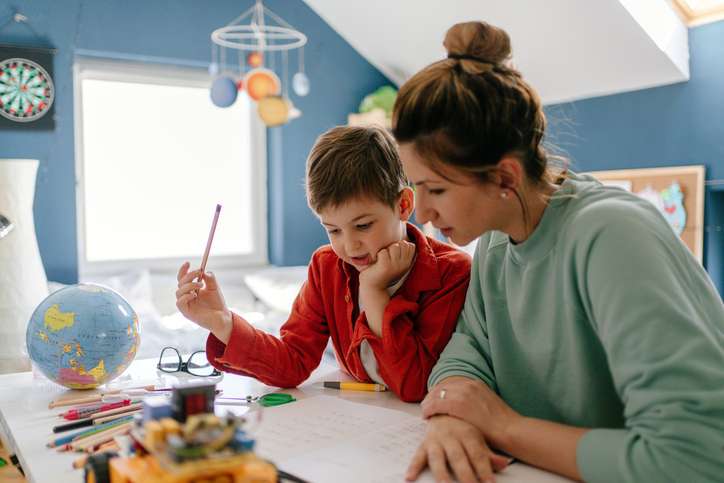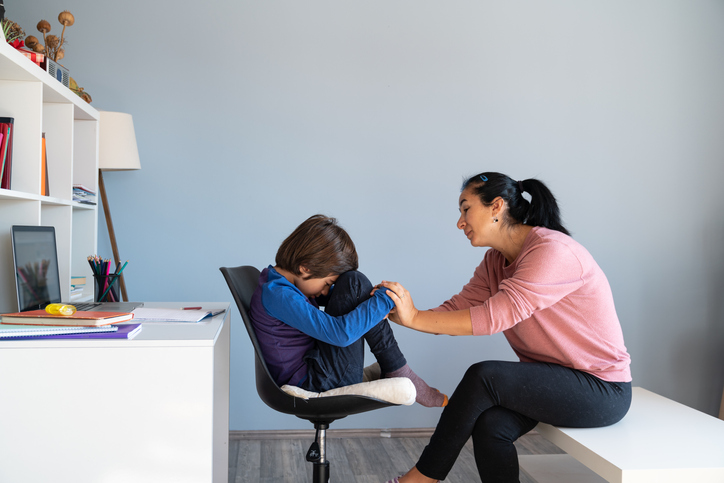Homeschooling Pros and Cons for Kids and Parents

Before the COVID-19 pandemic, just over three percent of American families homeschooled their children. In the years since, that number has jumped to just over 11 percent overall, and as much as 16 percent among Black and Hispanic families (Eggleston and Fields, 2021).
Today, families considering homeschooling have a wide range of resources at their disposal. From packaged homeschool lesson plans to websites and meetups, and even activity groups just for homeschoolers, all of the ingredients are there to help homeschooling parents make the most of their child’s education.
But doing homeschooling right can be a huge commitment and a lot of work. It’s definitely not for everyone, and that’s okay.
Is homeschooling right for your family?
Related: Can Homeschoolers Go to College? Learn How to Apply
Academic Benefits of Homeschooling
Homeschooling has some distinct advantages over traditional school. For families who homeschool during the early years and send their children to a traditional high school, the benefits are still there.
Homeschool families like to point out that students with a homeschooling education often score higher on academic achievement tests than students from conventional schools. This is true — at least when students follow a structured homeschool curriculum. Though the opposite is true for students who have not followed a structured program (Goodwin, 2021).
Smaller Class Sizes and Individualized Attention
Academic benefits come down to a combination of small group size and individualized curriculum.
Homeschooled children can learn at their own pace rather than being chained to the progress of a larger group. This means that students who struggle with some subject areas are free to go over the material as often as they need to. It also means that students can move more quickly through the material that’s easy for them.
Personalized Lessons That Meet Kids’ Needs
Another benefit is that families can tailor lessons to an individual student’s interests, needs, and learning style. The current educational system simply doesn’t have the resources to do this for every student.
More Educational Freedom
Some parents choose to homeschool out of concern for the learning environment: what is being taught and how.
Educating children at home gives families control over both of these factors. Many states require homeschooled students to study certain core subjects, such as math, reading and writing, but homeschool families can decide how to approach subjects such as moral and religious education.
Social Benefits of Homeschooling

Proponents of traditional schooling often express concern that homeschooled kids are missing out on opportunities to bond with their peers. This isn’t necessarily true.
A Strong Homeschooling Community
As home education becomes more widespread, homeschool groups for study and extracurricular activities have appeared for just this purpose. Homeschool networks allow parents to organize get-togethers for study, play, field trips, and more.
Less Peer Pressure and Bullying
Families concerned about peer pressure or problems with their local public schools no longer need to choose between educational and social development
Homeschooling families have greater control over their children’s social interaction — who, where, when, and how. So rates of bullying are far less in a homeschool environment.
Flexible Schedules and Special Accommodations
Home education can be the best option for families with certain concerns, including:
- Professional or family obligations that require a flexible schedule
- Religious or moral concerns
- Special needs that can’t be met by the school system or at a private school
Academic Disadvantages of Homeschooling
Homeschooling is hard work, and it’s not right for everyone. Before embarking upon this journey, it’s important to understand some of the challenges that you might face.
It’s easy to underestimate how difficult the job of teaching can be—in a lot of ways.
Lack of Structure
One of the benefits of home study is a flexible schedule. But that shouldn’t mean “anything goes.” A lack of structure can mean wasted time, and that can mean falling behind very quickly.
Setting up up a home schoolroom and having dedicated school hours can help to keep your family on track.
Limited Resources

Homeschoolers have a lot of resources and options, especially online. However, if you’re living in an isolated area, you may have a lot less opportunity for social activities and field trips.
Potential for Knowledge Gaps
Credentialed teachers study specialized techniques for teaching reading, writing, numeracy, and more. It’s harder than a lot of people think. And as your children grow older, the gaps between what you know and what they will need to know will grow.
Moreover, if your kids have special needs, such as learning disabilities, you may have to hire outside professional assistance. After a long day of working with your kids, you may find yourself using your “free time” to play catch-up.
Access to Higher Education
Finally, some universities accept academic credit from homeschool study, but many do not. You’ll need to plan ahead to make sure your child has the most options when they reach adulthood.
Emotional and Social Disadvantages of Homeschooling
Homeschooling also poses emotional challenges for both parents and kids.
Homeschool Parent Burnout
We all love spending time with our kids, but for homeschool parents, that time can seem endless.
Being a homeschool teacher can mean always being “on.” Burnout is common, and when you are the teacher, principal, social director, and janitor, it’s hard to find time for a break.
Social Isolation
Homeschooling can also be isolating. Most other kids will be at school, and many other parents will be at work. Being a homeschool parent means carving out the time for self-care and for adult social interaction, and that can be challenging.
Logistical Challenges of Homeschooling
Schools have lots of different personnel to facilitate academics, field trips, sports, social activities, teaching life skills, and so forth. But when you’re homeschooling, it’s all you.
You will have to make the opportunities for socializing. You will have to direct sports activities. You will have to organize field trips. And on and on.
This can be daunting, but it’s not impossible. If you’re not naturally organized, however, you may need a crash course in organization and time management.
You’ll need plans for each day. You’ll need yearly plans to make sure your kids meet state requirements for each grade. And you’ll want to plan in the long term so that your kids learn what they need to learn and gather the necessary credits for university or career education.
Financial Challenges of Homeschooling
Homeschooling can be expensive.
Pre-made homeschool lesson plans can run as high as $600 per year per child. If you want to join a homeschool group (or “learning pod”), that can cost several hundred dollars a week (Guha, 2022).
Other expenses may include:
- School supplies like pens, books, etc.
- Tutors or special needs learning specialists
- Field trips (museum admissions, transportation, and so on)
- Sports activities
- Outside classes
- And more
You’ll also have to factor in having one unpaid adult at home, rather than the two incomes that many families have.
How to Make an Informed Decision About Homeschooling
Is a homeschool education the right learning experience for your family? Ask yourself a few questions.
Do You Know the Law?
Many states have laws and requirements to make sure that students who study at home learn the subjects they need to succeed in adult life. Some states also require homeschool instructors to pass a general knowledge test. Other states test homeschooled students periodically to make sure they’re keeping up with their peers.
Those laws vary by state. The Homeschool Legal Defense Association has a state-by-state breakdown here.
Are You Organized?
A homeschooling parent is a teacher, curriculum designer, school psychologist, activity director, social director, and more. You will have to have organized lesson plans that give your children the knowledge they’ll need to succeed.
You’ll also have to make opportunities for them to engage with their peers and develop appropriate social skills.
You may also have to provide records of what, when, and how you teach your students, to state authorities, or later to colleges and universities.
That’s a lot of balls to juggle. But if you can do it, you may have what it takes to be an excellent homeschool parent.
Are You Willing to Study?
Do you remember everything you were taught as a child? Me, either. But if you want to homeschool your kids, you’re going to have to learn, or re-learn school subjects well enough to teach them. Even the subjects you hated.
And you’ll have to familiarize yourself with your child’s study materials so you can answer the questions that will inevitably arise.
You might also consider taking child development courses through your local community college so that you’re familiar with the educational milestones and techniques to help your kids to meet them.
Do you love to learn? You could be an awesome homeschool teacher!
Can Your Family Afford it?
Doing homeschooling right is a full-time job. It’s unpaid, and materials and field trips can get expensive. Can your family afford to have one full-time unpaid teacher at home? If not, are you willing to get creative to make it happen? If so, you’ll be in good company!
Do You Have a Solid Social Network?
Education isn’t only academics. One of the most important parts of education is learning social skills. In school, opportunities to interact with other kids and adults are built in. But if you’re educating your kids at home, you’ll need to seek out regular social opportunities for your kids.
This can be hard if you’re not naturally outgoing, or if there are limited social opportunities in your area. Homeschool groups, sports clubs, youth groups, and service organizations are a few places to start.
Are You Willing to Work Hard?
For many homeschooling parents, educating their children is the most rewarding and important thing they will ever do. And like everything that’s important and rewarding, it can be nonstop.
Are you ready to spend a lot of time organizing and interacting with your kids? Are you prepared to constantly seek out new academic and social opportunities? Are you prepared to do these things even when you’re frustrated, burnt out, and just don’t feel like it?
Then you just may be a homeschooler!
Resources for Families Considering Homeschooling
Curious? Here are a few resources to start your research.
The Homeschool Legal Defense Association should be your first stop for learning about the laws in your area. They also have resources for putting together lesson plans, addressing special needs, preparing your child for the real world, and more.
The Homeschool Mom has a variety of resources about types of home education, curricula, planning your school year, and so forth.
The Homeschool Resource Room has a handy roundup of free resources for homeschooling families.

